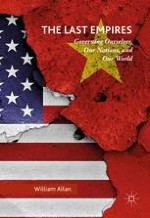2017 | OriginalPaper | Buchkapitel
2. Historical and Economic Roots of Neoliberalism
verfasst von : William Allan
Erschienen in: The Last Empires
Aktivieren Sie unsere intelligente Suche, um passende Fachinhalte oder Patente zu finden.
Wählen Sie Textabschnitte aus um mit Künstlicher Intelligenz passenden Patente zu finden. powered by
Markieren Sie Textabschnitte, um KI-gestützt weitere passende Inhalte zu finden. powered by
